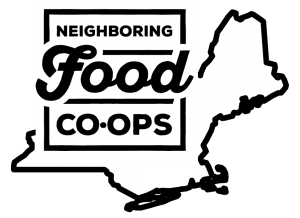 Your Neighboring Food Co-ops
Your Neighboring Food Co-ops
Locally Owned by More Than
150,000 People Like You!
In this Month’s E-News, check out:
- Let’s Rebuild Co-operatively
- Food Co-ops Featured in Civil Eats
- Welcome, Kingston Food Co-op!
- Farm to Freezer: Easy Spring Salads
- May’s Cave to Co-op Cheese Special
- New England Farmers Union: Farm to Food Box Program
- Our Neighborhood Co-op Calendar
As our food co-ops continue to grow in the Northeast, they also contribute to more resilient communities — which is just what we need as we work to rebuild from the COVID-19 pandemic.

In the wake of the Great Recession of 2008, there was a lot of talk about what was wrong with the economy, how unequal it had become in its distribution of its costs and benefits, how it had left so many of our communities vulnerable. Interest in co-ops grew dramatically, as it often does during economic crises, as many people considered how we might rebuild our economy differently.
While competition increased dramatically following the recession, our food co-ops continued to grow. In 2018, the Neighboring Food Co-op Association (NFCA) revisited the data from our first impact survey in 2008 and learned that our founding co-ops had grown almost 40% in shared revenue and membership over the following ten years. And while a few food co-ops in our region have closed, existing co-ops have expanded to additional locations and at least five new ones opened their doors. This growth enabled our co-ops to increase their impact, support more local producers, provide greater employment, and build more resilient local economies.
At the same time, control of the economy and food system has become more concentrated and economic inequality has also grown dramatically. The COVID-19 Pandemic has exposed the consequences of these trends as working people and communities of color have suffered the most severe consequences of the virus and the economic downturn that has resulted. To date, more than 100,000 lives have been lost, almost 40 million people have filed for unemployment, and millions of small businesses are at risk of closing permanently. Recent forecasts predict a new wave of family farm foreclosures, devastating rural economies and resulting in further consolidation of the food system.
Any strategy for addressing these issues and building a more resilient economy moving forward must focus on creating infrastructure that will serve our communities in the long-term. At our recent gathering of food co-op startup organizers, co-hosted with Food Co-op Initiative (FCI), our dialog focused on how we could be more successful in engaging potential members, community organizations, and local governments in their efforts. Just as importantly, how can our existing co-ops communicate their difference as we work to continue to serve our communities, providing them with safe, healthy food, and rebuild from the pandemic?
Co-operative businesses have been part of the social and economic fabric of our country since its beginnings, and today 1 in 3 people are members of at least one co-op. Still, we do not learn about them in school and they are generally overlooked in colleges and universities. So, when it some comes to launching a new food co-op, organizers often have to begin their effort with community education.
As we have worked to spread the word about our food co-ops at conferences, workshops, and other events, we have found that is useful to focus on some of the unique ways that co-operative businesses contribute to more healthy, just, and sustainable communities:
- Build on Local Skills & Assets
- Pool Limited Resources for Scale
- Contribute to a more Inclusive Economy
- Place Meeting Member Needs before Private Profit
- Grow a Sustainable Food System & Economy
- Maintain Good, Local Jobs
- Build Long Term Economic Infrastructure
- Anchor Wealth & Resources in the Community
- Work Together to Support One Another
Since 2008, our food co-ops have been working together to collect impact data to help us make our case. The results of our annual survey this year, based on data received and averages among our member co-ops, provides some compelling examples of how food co-ops demonstrate these impacts.
One thing that our startups remind us of is how the co-operative model empowers people and builds on local skills and assets. Food co-op organizing is community organizing, bringing people together to identify mutual needs and create solutions, together. And this work continues once the food co-op opens its doors, with member engagement being key to success.
Co-ops use the word “member” (or “member-owner”) because the relationship is different than one of individual ownership of a business or owning stock in a corporation. Rather, the purchase of a member share entitles a person to participation in their co-operative and a say in its governance. Members are active users of their community-owned grocery store, which exists to meet collective needs and goals – such as healthy food, a stronger local economy, and good local jobs. In this way, co-operative members are partners in the ongoing success of the business and co-creators of its impact. In 2019 alone, more than 12,000 people joined our local food co-ops, reflecting the desire to be part of a different way of doing business.
One of the more amazing things about food co-ops is their ability to pool limited resources for big community impact. For example, the average cost of a member share is just $153, but the average revenue of our food co-ops is nearly $12 million — and together, our Neighboring Food Co-ops have a dramatic impact on the regional food system and economy, generating more than $347 million in shared revenue.
The low threshold for membership and participation also means that food co-ops help build a more inclusive economy through broad community ownership. Across our region, 150,000 people from all walks of life – professionals, small business owners, and working people – are members of our 29 Food Co-ops and 10 startups.
As people-based enterprises, these co-ops are democratically governed on the basis of one member, one vote, rather than how many shares you may own. Perhaps not surprisingly, 60% of our food co-op boards of directors are women and half are under 50 (compared to 19% women and 3% under 45 on S&P 500 Boards). At the same time, our co-ops are working to be more representative of their communities, challenging themselves on issues of diversity, equity, and inclusion, and sharing models for ensuring access to participation for people on limited incomes.
Co-ops prioritize meeting the needs of their members and communities — the people who use the business — rather than maximizing financial returns for owners or investors. The co-operative business model reinvests any profits in the business and its community, or distributes them to members as discounts or patronage rebates according to how much they use the business. In 2019, our member co-ops distributed $4.9 million to members in discounts and patronage rebates. People on limited incomes received an additional $729,000 in discounts as part of efforts to increase food security. Member co-ops also donated $789,000 to local organizations serving their communities.
During the pandemic, our co-ops have worked to ensure continued access to healthy food while keeping people safe by adopting thoughtful, creative and comprehensive measures like limiting the number of people in the store at a time, installing plexiglass barriers at registers, and establishing dedicated hours for high-risk customers. In addition to Healthy Food Access programs that provide discounts to people on limited incomes, co-ops are partnering with local food banks, donating product and supporting fundraising.
Because they are not focused on maximizing profit, food co-ops can focus on other priorities, like building a sustainable food system and economy. The pandemic has sparked a new level of interest in local food for a variety reasons including perceptions of safety, shorter and more reliable supply chains, and supporting local businesses suffering the economic impacts of COVID-19. With local baked into our relationships, co-ops are well positioned to meet this demand and play a key role in helping our communities rebuild, and rebuild better.
For example, in 2019 our member co-ops sold nearly $94 million in local products with the average food co-op purchasing from 250 local suppliers. Local sales comprised an average of 30% of total revenue for our food co-ops, compared with the national grocery store average of just 1.8%. In a time of continuing food system consolidation, purchasing from a wide variety of suppliers may be seen as less efficient.
However, it also contributes to a more sustainable, diverse, and resilient economic web. For example, while our food co-ops faced some of the same challenges as other retailers in keeping products on their shelves during the early days of the pandemic, they were largely able to catch up by working with regional distributors and building on their relationships with local farmers and producers. This investment in local and regional economies will be vital to helping our communities bounce back in coming months.
Food co-ops have also been leaders in growing the market for sustainable farmers. Last year, our member co-ops sold $97 million in organic products, reporting an average of 34% of store sales (compared with a national grocery store average of just 5%). Organic agriculture not only supports the health of consumers, workers, and our environment, but has been recognized by the United Nations Food and Agriculture Organization (FAO) as a key tool in combatting the impacts of climate change by increasing soil health, capturing and storing more carbon (CO2) in the soil, and reducing the use of fossil fuels and the release of greenhouse gases. Co-op members also use their purchasing power to support and empower other communities though co-operative development and Fair Trade. For example, member co-ops sold an estimated $14 Million in fairly traded products last year, and $18 Million in products from farmer, worker and other co-operatives.
Food co-ops also build good, local jobs and career paths, employing more than 2,350 people across New England and New York State. More than 60% of food co-op staff are employed full-time and 65% are also co-op members, sharing in the ownership of their local grocery store. In addition to working to provide living wages, member co-ops provided $3 million in employee discounts. During the pandemic, our co-ops have worked hard to implement safety measures, enhanced compensation for frontline staff, and additional flexibility for employee schedules and work assignments.
This brings us back to how food co-ops build long term economic infrastructure. While organizing a successful food co-op takes time, the average member co-op has been in business for more than 30 years — with two food co-ops celebrating more than 75 years in operation. This means that a single co-op can produce benefits for decades, resulting in a more sustainable and resilient regional economy.
Food security is a challenge for both rural and urban communities as retail grocery store chains continue to consolidate. For many years, the neighborhood where I grew up in inner city DC had a local grocery store, until it was closed in favor of larger locations in the more profitable suburbs. Once established, food co-ops anchor wealth and resources in the community because profits stay local, rather than being transferred to outside investors. Their emphasis on buying local supports small business and sustains local economic activity. They are also very unlikely to leave the community because they are owned by the communities they serve, and because they are democratically governed they are very difficult to buy out.
Finally, co-ops work together to support one another and their communities, especially at times of crisis. For example, the Neighboring Food Co-op Association is a regional co-operative of food co-ops working to build a thriving co-operative economy, rooted in a healthy, just, and sustainable food system. By supporting growth, innovation, and shared success among our member co-ops, we increase our collective impact and support greater community resilience. More recently, we have worked to help co-ops access emergency relief, build peer networks among staff and board members, and shared successful strategies for responding to the impacts of the pandemic, ensuring that they can continue to serve their communities.
We also increase our impact by working with regional associations such as the Federation of Southern Cooperatives, the Valley Alliance of Worker Co-ops and the Vermont Association of Credit Unions, and with national networks including National Co+op Grocers and the National Cooperative Business Association. (Another way you can help during this pandemic is by giving to the Cooperative Development Foundation’s Disaster Recovery Fund, supporting co-ops impacted by the COVID-19.)
Your local food co-op is a community asset, owned by the people who use it to meet their shared needs. Working together, food co-ops create benefits that ripple out across our region and even around the world. And imagine the potential for rebuilding our post-pandemic communities when co-operative businesses work together across the economy. From food co-ops to farmer co-ops, worker co-ops to credit unions, and housing co-ops to energy co-ops, our collective impact is even stronger, providing a glimpse of what might be described as a co-operative economy that is more resilient, sustainable, and inclusive.
As we rebuild, let’s rebuild co-operatively.
Erbin Crowell serves as Executive Director of the Neighboring Food Co-op Association and Chair of the Board of Directors of the National Cooperative Business Association.
Thanks to CoBank for their support of our Neighboring Food Co-ops!
Food Co-ops Featured in Civil Eats

The Neighboring Food Co-op Association (NFCA) was proud to be featured in a recent article from Civil Eats, a nonprofit news organization with more 150 contributors who report on the evolving food landscape from Capitol Hill to Main Street, along with partners from the Federation of Southern Co-operatives, Food Co-op Initiative, and National Co+op Grocers. A daily news source for critical thought about the American food system, Civil Eats publishes stories that shift the conversation around sustainable agriculture in an effort to build economically and socially just communities.
“Compared to supermarkets with empty shelves and long lines, co-ops’ long-term focus on building resilient foodsheds is paying off,” begins the article.
“Co-ops serve with love and care and kindness, and people are coming in and finding new community, which resonates in a time of uncertainty,” says CE Pugh of National Co+op Grocers. That concept of community extends to workers, to whom many co-ops are providing hazard pay.
For the Neighboring Food Co-op Association’s Erbin Crowell, community building and outreach are where co-ops shine. “We have great potential to build local infrastructure, and to work across class and race and regions to build a more healthy and just sustainable food system,” he says.
Cornelius Blanding of the Federation of Southern Co-operatives agrees. “It all comes down to people helping themselves, and in order for that to happen, you have to cooperate. The pandemic opens our eyes to how basic our need for human contact really is.”
“The way we’ve come together to support our communities in this crisis has been a moment of light in the darkness and for us to realize, we weren’t playing around,” says Jacqueline Hannah of the Food Co-op Initiative. “We’re collectively building something that makes a difference. Imagine what would happen if we doubled down.”
Now Offering Personal Impact Deposit Accounts
Open an account today and help increase access to local, healthy food, deliver health care to more people, create affordable housing and build renewable energy. Your Choices Reflect Your Values. Your Bank Should Too. Check our rates and Open an Account today.
Thanks to National Cooperative Bank for their support of our Neighboring Food Co-ops!
The Neighboring Food Co-op Association (NFCA) is excited to introduce you to our newest Startup Member, Kington Food Co-op in Kingston, NY.
The Kingston Food Co-op started in 2018 as a group of folks unsatisfied with the grocery choices in Kingston, NY. Community members got together monthly on Sunday mornings to vision how their food
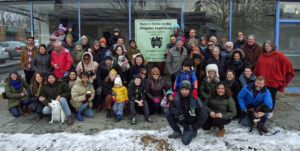
co-op would look and work. Their co-op is organizing to be located in a culturally diverse neighborhood of a city located 2 hours north of NYC, and their membership will continue to grow to reflect their community. The startup food co-op is working toward having a bilingual Spanish-English website, as well as Spanish-English interpretation at future meetings to include their whole community.
The Kingston Food Co-op is now two years into their start-up process, and they are excited to have over 500 founding member-owners, a building located centrally in their city, and a full-time project manager.
“Joining the NFCA was a no-brainer. We have already learned so much from the relationships we’ve built with other regional co-ops and the staff at NFCA – we never have to reinvent the wheel because information and support is available when we need it,” said Katy Kondrat, Project Manager of Kingston Food Co-op. “Our co-op is now connected to other start-up and established co-ops in our region who are working toward similar goals, and we have access to the wealth of knowledge and experience that Bonnie and others at the NFCA have to offer.”
Find out more and support the Kingston Food Co-op: https://www.kingstonfoodcoop.com/
The NFCA includes over 35 Food Co-ops and Startups across New England and New York State that are working together toward a vision a thriving co-operative economy, rooted in a healthy, just and sustainable food system and a vibrant community of co-operative enterprise. For a map of your Neighboring Food Co-ops, please visit https://nfca.coop/members
Is your food co-op looking for a safe, affordable option for online voting?
Simply Voting is a web-based online voting system that will help you manage your elections easily and securely. Ask about their discount for NFCA Member Food Co-ops. For more information, visit www.simplyvoting.com.
Farm to Freezer: Easy Spring Salads
Easy Spring Salads Featuring Local Fruits & Veggies
Outings might be more limited these days but with spring the desire for more salads is still relevant and 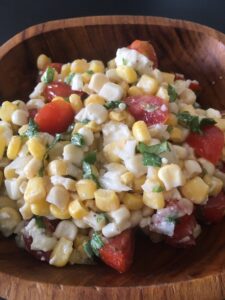 salad ideas using fresh and frozen veggies are nearly limitless! Having Neighboring Food Co-op frozen corn, green peas, and blueberries on hand enables quick preparation for a variety of salad combinations.
salad ideas using fresh and frozen veggies are nearly limitless! Having Neighboring Food Co-op frozen corn, green peas, and blueberries on hand enables quick preparation for a variety of salad combinations.
Here are some ideas using Northeast Grown Fruits and Vegetables and other ingredients available at your local co-op. Try Corn and Feta Salad from delish or Bon Appètit’s Pea and Prosciutto Salad for tasty meal additions. The U.S. Highbush Blueberry Council has a slew of recipes for fresh and frozen blueberries. Check out the Blueberry Quinoa Power Bowl using frozen blueberries, walnuts, watercress and quinoa or make a Blueberry Balsamic Dressing to dress up any green salad.
Now more than ever we see the importance of supporting our local growers and by choosing Northeast Grown Fruits and Vegetables we can support regional food production and contribute to a thriving regional economy. One of the main reasons NFCA began sourcing projects was to help our co-ops be more resilient in times like these. By establishing sustainable, viable, regional sources of products and by working with a regional distribution partner like Associated Buyers, NFCA has been able to offer some inroads to extending the marketing season for family farmers and creating branded, shelf-stable, nutritious products for co-op consumers in the Northeast.
Our co-ops have sold over 4 tons of frozen fruits and vegetables through the Farm to Freezer program last year, that’s one of the ways our co-ops work together to bring you the fresh, quality food all year long.
For more Farm to Freezer information and recipes—including comfort foods—visit: www.nfca.coop/farmtofreezer and these Co+op Stronger Together recipes.
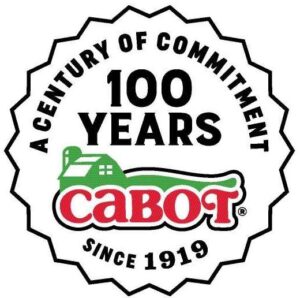 Thanks to Cabot Creamery Co-operative for their support of our Neighboring Food Co-ops!
Thanks to Cabot Creamery Co-operative for their support of our Neighboring Food Co-ops!
May’s Cave to Co-op Cheese Special
Madonna from Sage Farm Goat Dairy, Stowe, VT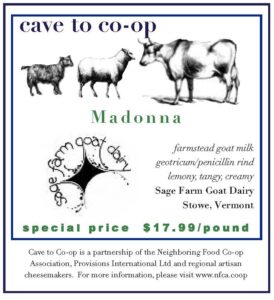
Madonna is a snow-white disc of ripened chèvre, a lemony, tangy paste which has been aged for 2-3 weeks and made with farmstead pasteurized milk by cheesemaker Molly Pindel.
Molly Pindell grew up in rural New Hampshire and worked for two years at the Haystack Mountain Goat Dairy in Bolder, Colorado where she fell in love with goats and began learning the art of cheese making. Sage Farm was started and is still run very much as a family farm with Molly and her sister Katie. Their two houses are located on either side of the milking barn. They try to divvy up the work load; Molly performs most of the cheese making and aging and Katie manages the goats and the pastures. Molly’s husband Dave keeps the books, and enjoys tractor work, ranging from compost management to hauling firewood. Bob, Katie’s husband, endeavors include maple syrup production, cider-making, and keeping all in a good sense of humor. Everyone pitches in selling and marketing their products, which include a variety of fresh and ripened goat milk cheese.
Enjoy Madonna eaten on its own in all its glory with nothing more than a crusty baguette or use in any recipe calling for a chèvre cheese. Feeling adventuresome? Try this seasonal special: Rhubarb, Chèvre and Carmelized Onion Grilled Cheese a recipe from Adventures in Cooking.
Cave to Co-op is a partnership between Provisions International and the Neighboring Food Co-op Association (NFCA) to support artisanal cheese producers in our region and make their products more easily available to co-op shoppers. Since the program’s incept, ten years ago, 26 tons of local cheese have been sold through the Cave to Co-op program. That is a lot of delicious cheese!
For more information on Cave to Co-op, visit: www.nfca.coop/CaveToCo-op

Thanks to New England Farmers Union for their support of our Neighboring Food Co-ops!
New England Farmers Union: Farm to Food Boxes
Farmers and food co-ops team up to feed local families.
“We are excited to see that Willimantic Food Co-op was successful in securing a winning bid for the 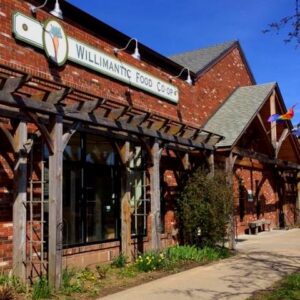 USDA’s Farm to Food Box program,” reports Roger Noonan, President of the New England Farmers Union.
USDA’s Farm to Food Box program,” reports Roger Noonan, President of the New England Farmers Union.
USDA Farmers to Families Food Box Program is part of the Coronavirus Farm Assistance Program Secretary of Agriculture Perdue announced in April. The USDA, under the Families First Coronavirus Response Act, is purchasing and distributing agricultural products to those in need.
“Through this program, USDA’s Agricultural Marketing Service (AMS) is partnering with national, regional and local suppliers, whose workforce has been significantly impacted by the closure of restaurants, hotels and other food service businesses, to purchase up to $3 billion in fresh produce, dairy and meat products. The program will purchase $461 million in fresh fruits and vegetables, $317 million in a variety of dairy products, $258 million in meat products and $175 million in a combination box of fresh produce, dairy or meat products. Suppliers will package these products totaling $1.2 billion into family-sized boxes, then transport them to food banks, community and faith-based organizations, and other non-profits serving Americans in need from May 15 through June 30, 2020,” states the USDA announcement.
“The Willimantic Co-op acting as the hub, working with its farmer suppliers, is precisely how this program should operate to assure local farms are at the forefront of feeding our communities. Should USDA or congress provide another round of funding, we hope they will award more contracts to small farms and co-operatives.”
The Connecticut Weekly Agricultural Report’s May 15 edition highlighted Sweet Acre Farm, a New England Farmer’s Union member, and the Willimantic Food Co-op as participants in the program.
Alice Rubin, General Manager of Willimantic Food Co-op reported that they coordinated with Sweet Acre Farm through their CSA program and a local dairy farmer, Mountain Dairy, to provide boxes for pick up at the co-op by Covenant Soup Kitchen clients. “The basic idea is pretty great – supporting local farms and getting good food to people who are in need. We have been working with Mountain Dairy since we opened our store and Sweet Acre for as long as they have been growing,” says Rubin.
From the Conn Ag Report: “Jiff Martin, UConn Extension Educator in Sustainable Food Systems, says ‘This is a really great story of how important building networks and trust over time is to ensure those relationships are in place when you need to respond quickly…. “
“The intent of the program is excellent, connecting farm and food distributors with food banks and other non-profits engaged in emergency feeding programs during this unprecedented time of economic hardship and disruption of the food supply chain. Unfortunately, the program mostly failed to deliver to local and small entities. USDA’s farmer eligibility requirements barred the vast majority of small and mid-sized producers from participating and with only a week from the announcement of the program to submission of bid further limited access to many farms and co-ops already dealing with pandemic related challenges,” concludes Noonan.
Our Neighborhood Co-op Calendar
JUNE 2020
June 8-12
Virtual CCMA for Food Co-ops Conference
June 4-12
Slow Living Summit: Take a Bite of Climate Change
https://www.slowlivingsummit.org/
June 15-24
Association of Co-operative Educators Institute – Now Online!
JULY 2020
July 4
International Co-ops Day: Co-ops for Climate Action!
July 20 – Aug 9
NOFA Summer Conference: Climate Solutions Are Grown In Soil – Now Online!
Co-Sponsored by your Neighboring Food Co-ops
(Members of NFCA Food Co-ops receive 20% off registration with the code “COOP2020”.)
https://nofasummerconference.org/
AUGUST 2020
August 13-15
Federation of Southern Co-operatives 52nd Annual Meeting
https://www.federation.coop/events
OCTOBER IS CO-OP MONTH!
October 7-9
NCBA CLUSA Co-op Impact Conference, Washington, DC
https://ncbaclusa.coop/2020-co-op-impact-conference/
October 8
Co-operative Hall of Fame, Washington, DC
Saturday, October 17
Columinate Co-op Cafe (Co-Hosted by NFCA)
https://columinate.coop/co-op-cafe-2020-resources/
The Neighboring Food Co-op Association (NFCA) is a co-operative federation of 35 food co-ops and startup initiatives across New England, working together toward a shared vision of a thriving co-operative economy, rooted in a healthy, just, and sustainable food system and a vibrant community of co-operative enterprise.




